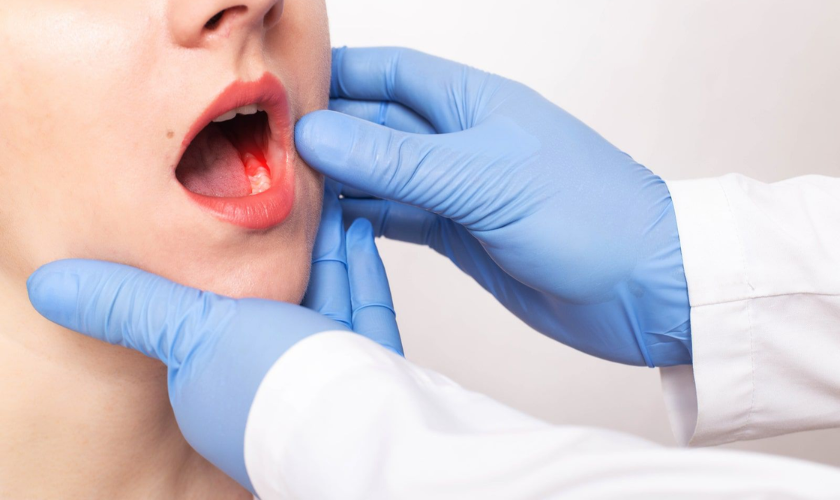Pay Online
How Bad Oral Hygiene Can Lead to Oral Cancer

In the hustle and bustle of our daily lives, oral hygiene often takes a backseat. We all know the importance of brushing our teeth, but do we truly understand the potential consequences of neglecting our oral health? It’s not just about cavities and bad breath—today, we’re going to explore a much more serious concern: the connection between bad oral hygiene and oral cancer.
Understanding Oral Cancer
Oral cancer is a serious condition that involves the development of cancerous cells in the oral cavity. It includes areas like the lips, tongue, gums, and the lining of the cheeks. It’s crucial to recognize that neglecting our oral health doesn’t just result in cavities and bad breath. Also, it can potentially contribute to the development of oral cancer.
To put it simply, oral cancer is like an unwelcome guest that can take root in our mouths when we don’t take good care of it. This type of cancer isn’t something far-fetched or rare—it’s a real and concerning health issue. The American Cancer Society reported that in 2021 alone, there has been a considerable increase in the cases of oral cavity and oropharyngeal cancers.
The Oral Microbiome: A Balancing Act
Our mouth has a diverse community of bacteria. It’s not all bad, though—some of these bacteria are actually good for our oral health. Think of it as a delicate balance, a kind of dance between the good and the potentially harmful bacteria.
When we neglect our oral hygiene, this balance gets disrupted. Harmful bacteria start to overstay their welcome, leading to an imbalance in what scientists call the “oral microbiome.” Now, this imbalance is not a good thing because it can create an environment where trouble starts brewing.
Picture it this way: the good bacteria are like the guardians of oral health, helping to keep things in check. But when the bad bacteria take over, it’s like an invasion that can lead to problems, and in this case, potential oral cancer.
Now, why does this matter? Because these bacteria aren’t just hanging out harmlessly. They release substances that can damage the cells in our oral cavity, setting the stage for the development of cancerous cells.
The Role of Plaque and Tartar
Let’s talk about plaque. Plaque is like a sticky film of bacteria that loves to hang out on our teeth. When we don’t brush and floss regularly, this plaque can get stubborn and turn into something called tartar. Tartar is like plaque’s hardened and more annoying cousin.
Now, why does this matter? Well, when tartar decides to stick around, it becomes a cozy home for harmful bacteria. These bacteria are troublemakers because they release toxins—nasty substances that can harm the cells in our mouths.
But don’t worry! There’s a superhero move we can make—regular brushing and flossing. By doing these simple acts, we kick out unwelcome guests and prevent them from causing trouble. It’s like giving our teeth a clean slate and saying, “No room for you, plaque and tartar!”
Inflammation: A Red Flag
When we don’t take good care of our teeth, plaque, and tartar team up to irritate our gums. This irritation is like a signal flare, telling us that trouble is brewing. The official term for this irritated gum situation is “gum disease,” and it’s a red flag we shouldn’t ignore.
So, why is gum disease a big deal? Because chronic inflammation, which is what happens when gum disease sticks around, can lead to serious problems. Inflammation is like a fire, and if it’s not put out, it can cause damage to the tissues in our oral cavity.
Now, damaged tissues are more vulnerable to all sorts of issues, including the development of cancerous cells. It’s like giving these cells a playground to misbehave. We definitely don’t want that!
But here’s the good news: we can prevent this by being oral health superheroes. Regular brushing, flossing, and dentist check-ups are our superpowers. They help keep our gums happy and inflammation at bay, reducing the risk of potential trouble like oral cancer.
The Tobacco and Alcohol Connection
When we smoke or chew tobacco, it’s not just our lungs that suffer. Our mouths take a hit, too. The chemicals in tobacco mess with the cells in our oral cavity, making them more vulnerable to mischief.
Picture it like this: tobacco is like a sneaky intruder that weakens our mouth’s defenses. With weakened defenses, the risk of cancerous cells finding a home increases. It’s like opening the door and saying, “Come on in trouble!”
Now, add alcohol to the mix, and things get even trickier. Alcohol irritates the tissues in our mouth, creating a welcoming environment for potential problems.
The Importance of Regular Dental Check-ups
Dentists are experts who can spot trouble before it turns into a major issue. Think of them as guardians keeping watch over our oral health. One superpower dentists have is early detection. They can catch signs of problems that we might miss, like unusual lumps or changes in the color of our oral tissues. Early detection is like catching villains before they cause real trouble.
Imagine dental check-ups as preventive missions. By going regularly, we stop potential issues in their tracks. It’s like putting up a force field to keep our mouths safe from hidden threats, including the risk of oral cancer. Dentist in Greeley don’t just fix problems; they also guide us on oral health habits. Prevention is always better than cure. Regular check-ups help us avoid major dental battles. It’s like a friendly reminder to stay on top of our oral hygiene game, preventing issues from escalating.
Breaking the Cycle: A Commitment to Oral Health
Daily Habits Matter: Breaking the cycle of poor oral health begins with our daily habits. Simple actions like brushing twice a day and flossing help break down the plaque and tartar that can lead to trouble.
Choose the Right Tools: Use the right tools for the job! A good toothbrush, fluoride toothpaste, and dental floss are like our trusty sidekicks in the battle for oral health. They help keep our mouths clean and fresh, preventing the buildup of harmful bacteria.
Say No to Tobacco: Breaking the cycle means saying a firm “no” to tobacco. Quitting smoking or chewing tobacco reduces the risk of weakening our mouth’s defenses and inviting trouble. It’s a powerful step towards a healthier oral environment.
Moderate Alcohol Intake: Moderation is key when it comes to alcohol. Limiting alcohol intake helps reduce irritation to our oral tissues, making it tougher for problems to find a foothold. It’s like creating a protective shield for our mouths.
As we wrap up our exploration into the intricate relationship between bad oral hygiene and oral cancer, the message is clear—our oral health is not something to be taken lightly. Beyond the superficial concerns of a bright smile, our commitment to proper oral hygiene is an investment in our overall well-being. By understanding the risks and taking proactive measures, we can all contribute to a healthier, cancer-free future. Let’s make a collective pledge to prioritize our oral health. After all, a simple habit like brushing your teeth today might be the key to preventing a much graver issue tomorrow.


